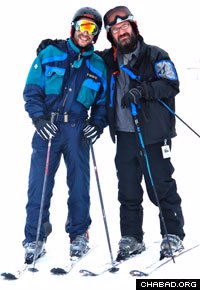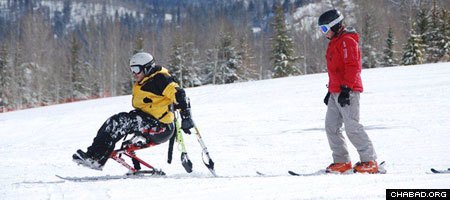Rick Schwarcz had already planned his family ski vacation this March to Snowmass Village, Colo., when he realized the trip coincided with the 12th anniversary of his mother Lillian’s passing. The timing posed a significant scheduling conflict for Schwarcz, who wanted to say the memorial prayer known as Kaddish, which requires a quorum of ten Jewish men in order to be recited.
“I knew that I had two choices,” said Schwarcz, a dentist from the Detroit area, who was traveling with his two children, Amichai, 23 and Yardena, 14. “I could either cancel the trip or try and find a place nearby where I could say Kaddish for my mother the three times that day that you’re supposed to.”
Schwarcz called his local rabbi, who referred him to Rabbi Mendel Mintz, co-director of the Chabad-Lubavitch Jewish Community Center in Aspen, a short 20-minute drive from Snowmass Mountain.
“Rabbi Mintz welcomed me enthusiastically to the Chabad House so that I could pray,” said Schwarcz, who arrived in Snowmass last Thursday. “But normally during the week they don’t attract a [quorum], so I wasn’t sure what would happen.”
The past week, however, was no ordinary one at the Aspen Chabad House, where for its fourth consecutive year, Mintz and fellow community members, in conjunction with UJA Aspen Valley, Challenge Aspen and a team of volunteers, hosted a group of injured Israeli combat veterans for Golshim L’chaim, or “Ski to Live". The week-long program provided the soldiers with therapeutic and recreational activities – skiing, bowling and festive meals – in a beautiful winter setting.
“We obviously can’t control what happens in Israel,” Mintz explained of the inspiration for such a project, which ran from March 1 to 8, “but we can control what we do about it. When you have a double amputee who doesn’t have use of his legs and feels as though he doesn’t have much life ahead of him, and then you show him over a period of two or three days how to ski down a mountain from top to bottom, the change of attitude in that person and what it does for him both physically and emotional is simply beyond words.
“There are guys here who thought they’d never get through what happened to them,” he added. “They have tears in their eyes. They feel like they have a new lease on life.”
When Schwarcz arrived last Thursday night, he recognized right away that he’d come across something special in the group of brave Israeli veterans. But while Schwarcz hoped they’d agree to join him as he said Kaddish for his mother, he also didn’t want to intrude on their awe-inspiring week of rehabilitation, recovery and immeasurable fun. Like many modern Israelis, these soldiers were secular and rarely, if ever, attended Jewish prayer services.
“I didn’t want to be rude and interrupt them,” admitted Schwarcz. “Neither I nor Rabbi Mintz knew what to expect. But they sat with me and were very patient and generous. They said to me, ‘Please take your time. Don’t rush.’ Afterwards I told them my mother would have considered it a great honor that those who helped me say Kaddish were former members of the Israeli army. It was a very moving experience.”

Meaningful Encounters
Shahaf Segal, one of the eight veterans Schwartz met, had all but lost hope before he came to Aspen with “Ski for Life” last winter.
“The experience has allowed me to leave my injuries behind and focus on my future and school,” revealed Segal, who was shot in the arm while fighting in the Gaza Strip.
This year, Segal, whose arm is completely paralyzed, returned to help assist the other soldiers, including one who is deaf and blind.
“This has been the most rehabilitative thing I have done since I was injured,” Segal declared of the experience. “I can’t thank Chabad in Aspen enough for what they have done for me and my fellow vets from Israel.”
Friday late afternoon, Schwarcz met the soldiers on the slopes, at a restaurant at the base of Buttermilk Mountain where they had gathered with Mintz for a kosher après ski snack.
“I needed to say Kaddish one last time but I also needed to make it back to our hotel in Snowmass before Shabbat,” informed Schwarcz, who adheres to the work prohibitions proscribed for the Jewish day of rest, which includes no driving. “Once again, they were extremely gracious with their time. Even though Rabbi Mintz probably had the busiest week of the year with the Israeli soldiers in town, he went out of his way to accommodate my needs and make me feel welcome.”
For Mintz, Schwartc’s brief but meaningful encounters with the Israeli soldiers furthered the beneficent spirit of the “Ski for Life” program.
“When we started this four years ago, we certainly figured it would have a great impact on the guys that we brought over from Israel,” noted Mintz, “but we could never have imagined the equal effect that it would have on all the people that are involved in making it all happen: those who volunteered to bring or cook food, those who generously gave donations. The bonding that the program does between our community and these guys is really inspiring and amazing.”
Mintz also reiterated that the goal of the program does not necessarily hinge on snow, slaloms and ski lifts.
“We’re not trying to make them skiers,” he said of the visiting veterans. “What we’re doing is giving them the tools, both psychological and physical, so that they can go back home to Israel and truly believe that they can do anything.”





Join the Discussion